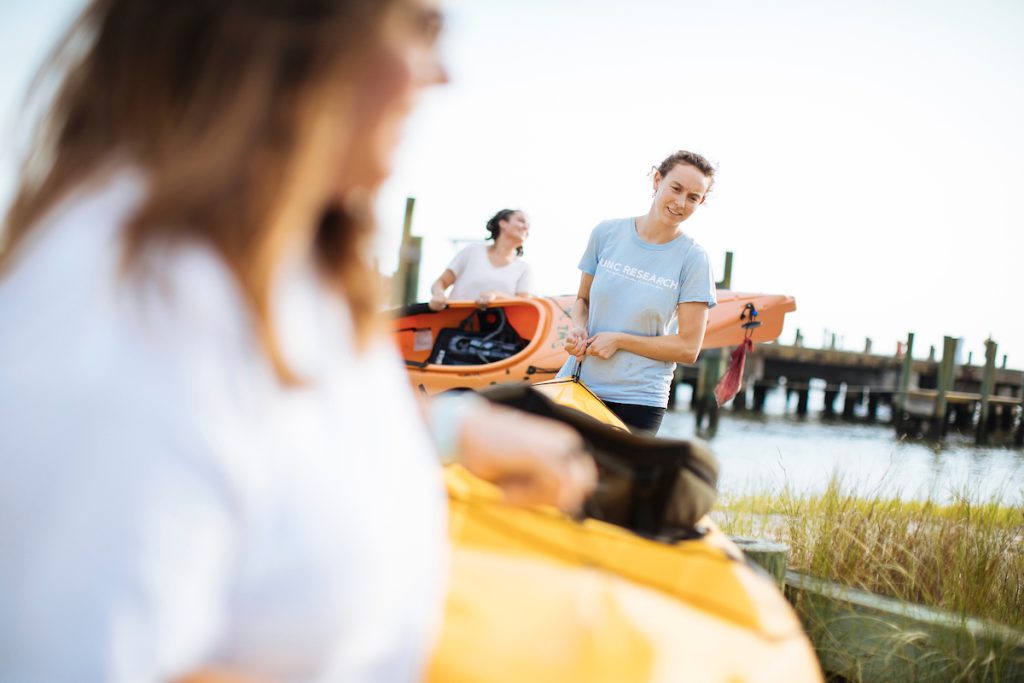Internships + Awards
To foster hands-on education and real-world experiences, and through the support and generosity of donors, the Institute for the Environment (IE) offers internships and awards to UNC students. In addition to summer-long internship awards, there are need-based scholarships available to attend semester-long field sites and for other opportunities after you return. Additional awards to support participation in international study abroad programs are available when those are led by an IE faculty or staff.
Internships
Internships are mentored, one-on-one experiences that offer students individual practical experience in settings that match their interests. When possible, internships tie in with a student’s other coursework to magnify and extend the impact of the internship, and to provide benefits to both students and host organizations. Because of the broad range of disciplines that intersect with environmental studies and sciences, the menu of possible internships is rich and varied.
21st Century Environmental Health Scholars
21st Century Environmental Health Scholars (21EH Scholars) is a year-round program that provides environmental health science research internships for undergraduate students at North Carolina Central University (NCCU) and UNC-Chapel Hill. Working as part of a lab team, 21EH Scholars will learn about cutting-edge research topics and develop research skills. They also will develop their science communication skills and prepare to apply to graduate school. Learn more.
EcoStudio
The EcoStudio engages with organizations on- and off-campus who are interested in working with UNC students. Weekly meetings in the EcoStudio with a faculty adviser, client and other EcoStudio students will broaden students’ skillsets and connect them with peers, growing their network and building communication skills. EcoStudio is offered through the Environment, Ecology and Energy Program in partnership with IE. Learn more.
The Pavel Molchanov Scholars Program
The Pavel Molchanov Scholars Program, an endowed internship program, is a partnership between the IE and environmentally focused small businesses, non-profit organizations and government institutions in North Carolina, South Carolina and Virginia. Each year undergraduate students are matched with an environmental internship where they gain hands-on, professional training. Each Molchanov Scholar receives a stipend to support their summer experience. Learn more.
Awards
Awards are one-time payments to a student. Awards for attendance to a field site or a study abroad program require students to be admitted to be eligible to apply. Unless otherwise noted, awards are paid to a student’s account with the university cashier’s office. A student applying for the field site or study abroad program awards must complete an online application and essay. Only complete applications will be reviewed.
Environmental Justice Graduate Research Scholarship
Graduate students from diverse academic and personal backgrounds can apply for the Institute’s Environmental Justice Graduate Research Scholarship. The award will be presented to up to two applicants who can demonstrate a research plan that broadens understanding of environmental justice issues in marginalized communities in North Carolina, with research methods that could be modeled for use beyond the state. Interdisciplinary projects and collaboration with N.C. communities are encouraged. Learn more.
Field Site Awards
There are IE need-based awards to attend a semester-long domestic IE field site at the Highlands Field Site, the Morehead City Field Site or the Outer Banks Field Site. These awards are available to meet financial needs not met by financial aid packages. Learn more and apply now for a need-based award.
In addition to awards to attend a field site, there are merit-based awards available for UNC students when they come back from attending one of the IE domestic field sites: the Highlands Field Site, the Morehead City Field Site or the Outer Banks Field Site. Students must be currently enrolled both when applying for and when using the below awards.
Merit-based awards:
- up to $750 to attend a conference to present work completed at a field site. Applications are rolling until there are no funds remain for the year. Learn more and apply now.
- a summer research assistantship at one of the field sites to include a stipend of $6,000 for housing and living expenses. One assistantship at each of the three field sites will be awarded each year. Applications open February 1. Learn more and apply now.
For more information, contact Susan Cohen, associate director of the UNC Institute for the Environment, at susanac@email.unc.edu.
International Study Abroad Program Awards
IE helps to meet need not covered by financial aid packages to attend international study abroad programs that are led by IE faculty and staff. This includes the Burch and Ecuador/Galapagos summer programs. Applicants must be accepted into a program to apply. Learn more and apply now.
For more information, contact Susan Cohen, associate director of the UNC Institute for the Environment, at susanac@email.unc.edu.
Meet the Donors
 Betsy Steele and Geo. Watts Carr
Betsy Steele and Geo. Watts Carr
The Betsy Steele and George Watts Carr Environmental Student Support Fund generously provides support for students attending both domestic and international field sites with preference given to students participating in the Morehead City Field site whenever possible. The Carrs were inspired to give because of the hands-on experience and learning they valued when they were students at Carolina.
Pavel Molchanov
Pavel Molchanov is a director and equity research analyst at Raymond James & Associates. He joined the firm in 2003 and has since been working as part of the Energy Group, researching oil and gas, renewables, and clean technology. He joined the UNC Institute for the Environment Board of Visitors as a member in 2019, and he also serves as a member of the advisory board at Cool Effect, an environmental project-funding charity. In 2022, Molchanov was named to the Board of Visitors for the University of North Carolina at Chapel Hill. Molchanov discovered his passion for studying energy and natural resources while at Duke University, where he graduated cum laude in 2003 with a bachelor of science degree in economics.
 G. Timothy and Jessica Hope Pate
G. Timothy and Jessica Hope Pate
The G. Timothy and Jessica Hope Pate Environmental Science Field Program Award supports students in a variety of ways. The Pate Award primarily supports attendance at both domestic and international field site programs. In addition, under certain circumstances, the program provides additional support for other experiential experiences for field site students including research and internship opportunities. This fund was inspired by Jessica’s wonderful experience at Carolina and the role the environmental field sites played during her time at UNC.
Scurry Family
The Scurry Family Environmental Field Site Fund supports students participating in the domestic North Carolina Field Sites. The fund is open to all students, but a preference is given to business majors who participate in the program which also provides support for research opportunities. Ms. Scurry was inspired to establish an environmental scholarship program to honor her husband who was a business major at Carolina.
 Wyatt-Stoneburner Family
Wyatt-Stoneburner Family
The Wyatt-Stoneburner Family Fund supports at least one undergraduate student participating in field site experiences at UNC’s Environmental Field Site located at the Highlands Biological Station in Highlands, N.C. The fund provides financial assistance such as travel, living and related expenses. This fund was established by Robert Wyatt (B.A. ’72), executive director emeritus of the Highlands Biological Station, and his wife, Ann Stoneburner, who both spent time as students and researchers botanizing in the Highlands area. Robert inaugurated the Station as a field site for UNC’s Institute for the Environment in 2001.



